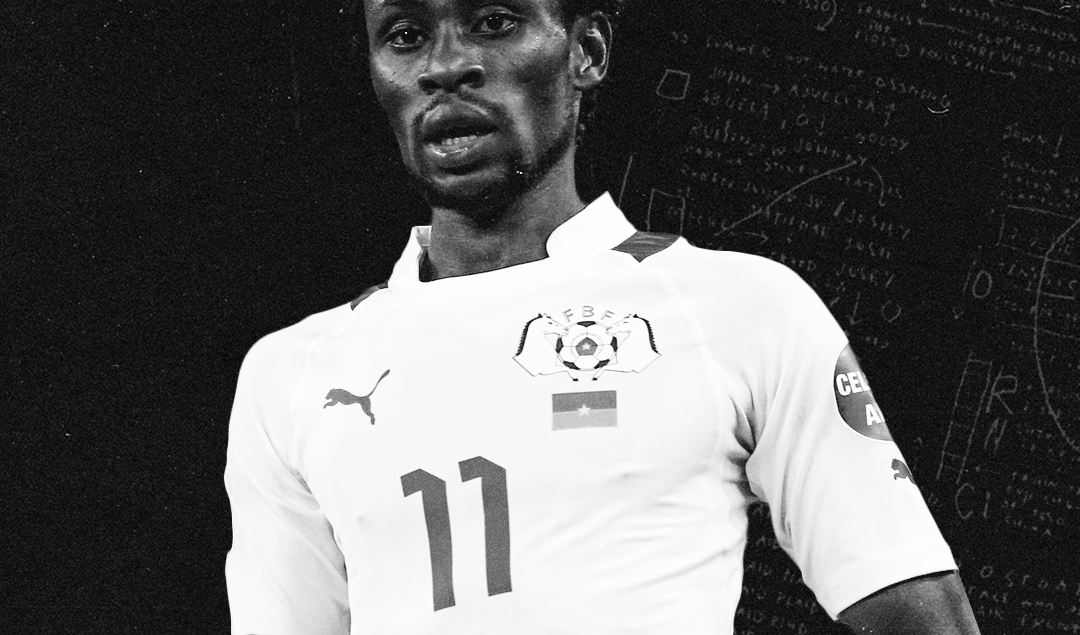How Burkina Faso Defied the Odds to Reach the 2013 AFCON Final
When sifting through the history of African football, rich in its moments of liberated passion and glory, there are many great unforgettable stories that come to mind. However, for many football fans, even those with an interest for football in a continent where these singular stories of splendour; so anomalous, so exhilarating, the story of Burkina Faso’s spectacular 2013 African Cup of Nations run is one so often overshadowed by the unforeseen success of Zambia one year earlier.
The Burkinabé journey began in the darkness and despair of 2012. In the midst of Chipolopolo’s finest hour, Burkina Faso had endured seven straight AFCON tournaments since the turn of the millennium, five of which they qualified for, without a single win to their name.
Further towards the western coast of the continent, Belgian manager Paul Put was left equally short of hope when his last-resort relocation to Africa, in the wake of match-fixing allegations in his home country, resulted in being sacked from an unsuccessful stint with the Gambian national team.
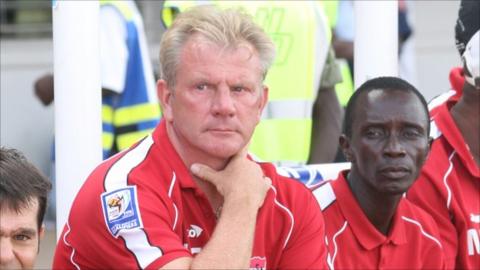
Photo: BBC
When two variables, seemingly on the verge of rock bottom, merged in March 2012, it provoked a sense of promise for both, but one of little acknowledgement from elsewhere given their recent past. Little did anyone know that a pair of ingredients so underwhelmingly perceived across the world of football would produce such a fruitful recipe for success.
Following defeat at the hands of Congo and Gabon in Put’s opening two games in charge, Les Etalons stretched their worrying eight-game winless streak seamlessly into the Belgian’s tenure and then into the second leg of their sole AFCON qualification tie with Central African Republic when they lost 1-0 in the away leg in Bangui.
It would take enormous spirit and insistence for them to mount a comeback, especially when Les Fauves doubled their aggregate lead just seven minutes into the match in the Burkinese capital of Ouagadougou.
But as Burkina Faso’s eye-catching exploits would later prove, Alain Traoré’s 96th minute goal, which sent the Stade du 4 Août into exultation as they snatched a place in the Cup of Nations at the death, was just the first of many displays of insurmountable courage.
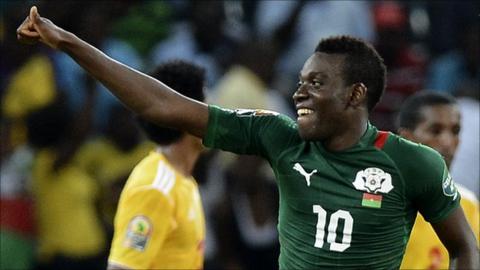
Photo: BBC
With a squad known mostly in France, Burkina Faso boasted a side charged with top-flight talent. Through the core of the team was Lyon’s Bakary Koné at the back, with midfield standouts Charles Kaboré and Jonathan Pitroipa of Marseille and Rennes, respectively, and the aforementioned Traoré of Lorient, alongside Aristide Bancé of Augsburg in attack.
The Burkinabé were unquestionably capable of competing, perhaps even abolishing the burden of being the only country to be eliminated from the tournament three times without securing a single point. But when they were drawn in a group consisting of Nigeria and reigning champions Zambia, eradicating their AFCON ghosts certainly seemed easier said than done.
Matchday One saw Les Etalons face a star-studded Nigeria side that were considered amongst the favorites to win the tournament. However, with the legendary duo of Vincent Enyeama and Joseph Yobo nearing the end of their international tenure, and the lack of experience elsewhere in the team, Put’s men had slim hope of an unexpected upset.
Midway through the first half, the Burkinabé had matched Nigeria for the most part, but offered little in terms of attacking impetus, and when Emmanuel Emenike broke the deadlock for the Super Eagles, it looked like it could well have opened the floodgates for one or two more.
Nevertheless, as the underdogs by all accounts, Burkina Faso stayed firm and frustrating for the opposition, as their confidence and subsequent space in attacking areas grew the longer the game went on.

Photo: Getty
Captain Moumouni Dagano forced a save out of Enyeama with a low, driving shot at the start of the second half. The game began to open up, forcing Nigeria manager Stephen Keshi to summon Ikechukwu Uche on the hour mark as the Super Eagles went in search of a second.
However, just a few minutes later, he blew their best opportunity to seal the win by skying a shot from six yards out. And so, the possibility of an equaliser emerged ever-probable as time, and the Burkinese battery, progressed. That possibility was strengthened when Pitroipa pirouetted past Efe Ambrose, who body checked him and promptly received his marching orders.
Nigeria were a man down, but undoubtedly, their quality remained superior to the Burkinabé. Patience and heart were needed as much as a golden moment of quality. This soon proved to be a pattern, a pressure, in their games that proved integral to their success.
Emenike, Mikel, and Musa all possessed the speed of mind and feet that, at its best, Burkina Faso simply could not live with. But live with it, and thrive off their capacity to contain it they did, from the first kick of the game up until the very last.
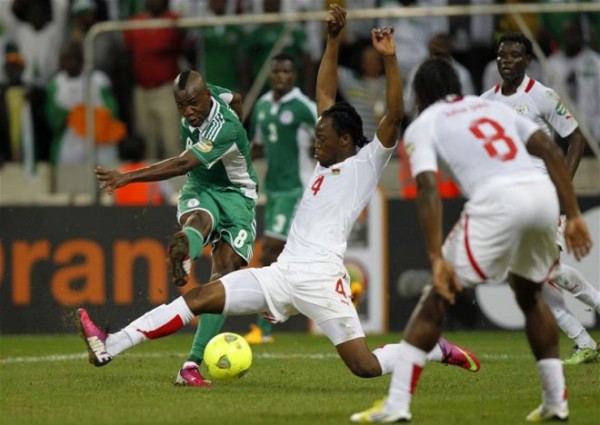
Photo: Soccernet.ng
With 94 minutes on the clock, Pitroipa emerged with the ball from midfield with the combined power, poise and patience of a man expunging the thought of ‘this game is yours for the taking’ looming in his mind for large parts of an untidy affair.
A quick one-two sent him racing through down the right but with very little options in the centre. His cutback, laid frustratingly between the paths of two onrushing team mates, rolled aimlessly for Godfrey Oboabona to clear, but the centre back, seemingly in earshot of the voice in Pitroipa’s head, allowed the ball to run through his legs and perfectly into the path of Alain Traoré, who made no mistake in slotting home a historic equaliser.
The performance was far from perfect, but the passion, and the potential of Paul Put’s team as a collective was there for all to see from a memorable first fixture.
Four days later, Matchday Two played host to an encounter between two teams brimming with confidence on the back of opening day results unforeseen on paper, but understandable and encouraging on merit.
Ethiopia were the opponents looking to build upon a 1-1 draw with Zambia, and after their early attack saw Shimelis Bekele strike the inside of the post, it was clear that Les Etalons had a game on their hands. However, after withstanding a handful of early Ethiopia attacks, Traoré was on the scoresheet once more as his thunderous effort sent Burkina Faso into half time one goal to the good.
Photo: Reuters / Thomas Mukoya
After the break, the composure, portrayed stoically by the Burkinese in Matchday One was all but forgotten as goalkeeper Abdoulaye Soulama, who, after getting off lightly when his attempted take on of Shimelis was dispossessed just minutes prior, caught a long ball 20 yards from his goal. Unsurprisingly, referee Bernard Camille saw right through his protests of innocence to pave Walias’s way back into the game against ten men.
The Ethiopians were experiencing an unlikely role reversal after their heroics last time out when goalkeeper Jemal Tassew was shown red just 35 minutes in against Zambia, although it was them who found themselves a goal down on both occasions.
Following the 1-1 draw in the other Group C fixture between Nigeria and Zambia earlier in the day, Soulama’s outlandish actions were indicative of a group destined for four out of four identical results. But it was a moment of adversity, of great pressure, and of opportunism that brought out the best in the Burkinabé once more.
Ten minutes later, Traoré and Pitroipa again partnered up with the former hammering home the latter’s lay off to give Burkina Faso some much needed breathing space. Soon after, it was the turn of Djakaridja Koné (of Ligue 1’s Evian) to maraud from midfield. Their high press prevailed once more after Koné’s interception found Pitroipa who drove at the Walias defence before laying it back to the powerhouse to put his side three ahead.
Thirty minutes on from Soulama’s red card, what looked to be a game-changing moment, it was clear that this setback had only enhanced the infectious determination and dedication throughout Paul Put’s side as they raced away for four. Pitroipa was at the heart of the attack yet again as he turned goalscorer when the fresh legs of Benjamin Balima broke free with the ball down the right before putting it on a plate for the playmaker to secure his side pole position after two group games.

Photo: Gallo Images / Getty
Five goals, four points and one colossal warning to the remaining teams in the tournament. Burkina Faso, in the wake of their first Cup of Nations win since 1998, looked ready to send shockwaves through the continent.
Heading into their third and final group game, Les Etalons had earned two points more than both Nigeria and opponents Zambia and as a result, given that Nigeria were expected to win against Ethiopia, they were in need of a result if they were to qualify for the knockouts.
Nelspruit’s Mbombela Stadium, home of Burkina Faso’s two fixtures so far, was the setting for yet another eerily tense affair. Again, however, it was one that suited the Burkinabé, who, for someone with no other context, would have deemed them to be the team highly experienced on the big stage, not their opponents.
Throughout the game, played predominantly in and around the Burkina Faso area, replacement keeper Daouda Diakité was busy but untroubled for the most part as Put’s men battled robustly for a grey but glorious 0-0 draw. And after two Victor Moses penalties late on gave Nigeria the edge over Ethiopia, the champions of 2012 were handed a shock exit by a pre-tournament write off just one year on.

Photo: Gallo Images / Getty
Having advanced as winners of Group C due to their superior goal difference, they managed to avoid Ivory Coast. Instead, it was Togo who stood between them and a place in the final four. The stakes and consequent reservations were apparent on both sides through the opening exchanges of the game, held at what had become a homely Mbombela Stadium for the Burkina Faso’s fourth game running.
Les Eperviers were ever-dependent on the excellence of Emmanuel Adebayor, who was continuously crowded out by the Burkinese back four, and going forward, Pitroipa and co. were equally reticent. On the evidence of the first half, you would’ve been a fool to gamble on the game being separated by anything more than the solitary goal.
After the break, Adebayor ghosted in between Djakaridja Koné and Sanan Panandetiguiri in trademark fashion to win the header ahead of the keeper before his effort was cleared by the latter inches from crossing the line.
As the game edged closer towards the inevitable extra time, neat link-up between Pitroipa and Prejuce Nakoulma saw a rare entry into the penalty area down the left flank for the Burkinese, and when Nakoulma’s feint lured Togo midfielder Vincent Bossou into diving in, a seemingly clear penalty was waived away, much to the amazement of everyone in the ground, none more so than Paul Put.
In a game where chances were incomparably few and far between, rage emanating from his glunch expression was completely rational.

Photo: Ian Walton / Getty
Into the dying embers, and it was clear the Togolese were tiring, or at least ten of them were as one-man army Adebayor controlled a hopeful punt perfectly before racing past two Burkinabé defenders and into the penalty area. The angle was tight, and fortunately enough, Diakité was equal to his strike to sustain the stalemate through to the end of normal time.
Extra time began with Burkina Faso, in customary fashion, showcasing incredible levels of fitness as they continued to strengthen when their opponents were slowly starting to deteriorate; pressing relentlessly, keeping possession intelligently until one lapse of concentration presented an opportunity.
That chance arose on minute 105, when an out-swinging corner, expected to be targeted towards the potent Bancé lurking at the back post, at least by Togo keeper Kossi Agassa, was flashed across the front by Charles Kaboré and directed home spectacularly off the underside of the crossbar by the backpedaling Pitroipa before Agassa could react.
An advantage, albeit slender, was in Burkina Faso’s grasp, and once again, it was their incessant work rate and will to succeed for themselves and each and every other piece of Put’s master plan that got them over the line.

Photo: Ian Walton / Getty
After seeing off Cape Verde in the quarter finals, it was the turn of Ghana to travel to Burkina Faso’s adopted home in Nelspruit just three days on from the Togo victory.
Having played 30 minutes less and one day earlier, on top of having the likes of Asamoah Gyan and Kwadwo Asamoah at their disposal, Kwesi Appiah’s men were many fans’ certainties for the final. As the emerging pattern of their previous matches displayed, the Burkinese possessed finite quality and cutting edge, but those deficiencies were so spectacularly replaced by infinite work ethic and team cohesion as they took another of the favourites all the way.
As snow fell gently around the Mbombela Stadium, Saidou Panandetiguiri protested that Christian Atsu followed suit as the then Porto youngster climbed to beat the Burkinabé in the air before the full-back pulled him down softly in the area. Mubarak Wakaso stepped up and coolly dispatched to put the Black Stars in front on 13 minutes.
In spite of an early setback, Burkina Faso remained unfazed and continued to defend well against the Ghanaians, who were looking to extend their lead right the way through the first half.

Photo: Ian Walton / Getty
After the break, Put’s side started to find their feet in proceedings. Bancé threatened initially with a bullet header that was clawed away by the Ghana keeper just inches from crossing the line, and when his next chance came a few minutes later, the target man made no mistake when persistent pressing from the Burkinabé in the early stages of the second period finally paid dividends.
The high press was led by Florent Rouamba, an unsung hero of Les Etalons’ setup who was emblematic of the team’s outstanding, constant work rate. The defensive midfielder’s interception found Kaboré, who exploited the yawning space in the Black Stars defence to send Bance away, who slotted home the equaliser unerringly.
Again, Burkina Faso got better and better as the game went on, and when nothing could separate the two teams when 90 minutes were up, they continued to push for the win in extra time. In the first half, Nakoulma had a goal ruled out after his tussle with Kwadwo Asamoah was deemed unfair. Bancé then saw another brilliant effort somehow cleared on the line via the thigh of Harrison Afful.
A mazy Pitroipa run was then cut short by the reckless right leg of John Boyé in the penalty area, but the referee, to the disbelief of the Burkinabé and the relief of the Ghanaians brandished a second yellow card to the bewildered Pitroipa. A dive was awarded, but it was undoubtedly a key decision at a crucial point of the game that went wrongly against them once more.
Not long after, the Ghanaian defence was opened up for a golden Bance opportunity, but his goal-bound strike on the swivel was diverted wide by Asamoah in stoppage time as Ghana held on by the skin of their teeth. Only penalties could decide Burkina Faso’s unfathomable fate.

Photo: Ian Walton / Getty
After 30 minutes of constant pressure in extra time, the momentum, and the confidence was with Put’s men as the shoot out began.
Isaac Vorsah’s scuffed shot went horribly wide to kick things off for Ghana, followed by Les Etalons’ third choice, Paul Koulibaly whose saved spot kick evened things up at 2-2 heading into the penultimate penalties. Substitute Emmanuel Clottey then dragged past the post for Ghana in identical fashion to Vorsah, giving Bancé the opportunity to put the Burkinabé ahead.
After seeing two golden opportunities to become the hero agonisingly averted during normal play, this was his moment of redemption. In one of, if not the biggest game in the country’s history, the tension, unbearable to many, was cut in quite extraordinary fashion by the striker.
Bancé strolled up to the box with an ill-suited swagger given the uncharted stakes at play. No one else in the ground could quite handle his high-risk, high-reward showmanship, especially considering his penalty would not even win the tie, but when he showed unbelievable composure to dink the shot past Fatau Dauda, before performing a sardonic celebration as he cupped his ears during a slow rotation, soaking up the atmosphere.
For that few seconds, he owned the pitch with a confidence and a certainty that could only have had a significant psychological effect on both teams. Bancé’s infectious conviction was substantiated with the next penalty as Daouda Diakité comfortably palmed a tame Emmanuel Agyemang-Badu effort wide to send the Burkinabé to their first ever African Cup of Nations Final.
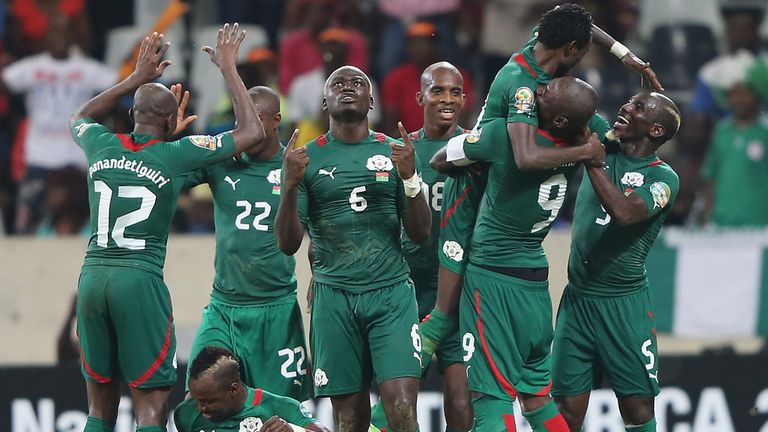
Photo: Sky Sports
Burkina Faso had improved astronomically from their opening day draw with Nigeria, and it was time to test their resolve against the Super Eagles once more as Stephen Keshi and co. stood between them and the unthinkable.
An appeal overturned Pitroipa’s unjust red card from the semi-final meaning the main man was eligible to play, Diakité retained his spot between the sticks after his shoot-out heroics topped off a string of solid performances. Burkina Faso were as ready as ever to claim the continental reigns. Only this time, a tournament first for the Burkinese, they weren’t playing in their trusty Mbombela Stadium.
In similar fashion to the group game, and every other game involving the Burkinabé, virtually nothing separated the two teams throughout the early stages.
Chances were a premium at both ends as half time approached. But when Djakaridja Koné’s block found Sunday Mba 25 yards from goal, the midfielder flicked the ball over Mohamed Koffi with his right before volleying past Diakité with his left to give Nigeria a precious advantage at the halfway stage.

Photo: Manus van Dyk / Gallo Images / Getty
The Burkinese held firm to halt what was largely one-way traffic through the majority of the second half. Patience and heart was again in order if they were to claw their way back into a game that was slipping from their grasp.
On 73 minutes, their chance finally came when Wilfried Sanou was set free by Nakoulma inside the right flank of the penalty area before he unleashed a fierce strike across goal which was expertly tipped wide by Vincent Enyeama.
Frustrations arose as the Burkinabé continued to push forward to no avail on a day where such fine margins, for once, found the immovable, interminable Burkina Faso on the wrong side as the game ended 1-0.
This was Nigeria’s triumph, Nigeria’s trophy, Nigeria’s name etched in the history books. But in momentary misery, a staggering sense of pride shone through for a Burkinese bunch, led by a Belgian, who had all earned national hero status, having achieved so much more than was ever expected of them. For them, this was about more than 90 minutes of disappointing football, which bore insignificance in comparison to years of distinguished disappointment.

Photo: Nic Bothma
The Burkinabé may not have won the game to set them aside Zambia’s greats of 2012, or any other teams stamped in African footballing folklore, but with the tremendous teamwork and shatterproof spirit to reach a final in a tournament they weren’t expected to win a single game in, they certainly earned the right to compete within that conversation.
By: Brad Jones
Featured Image: @GabFoligno
